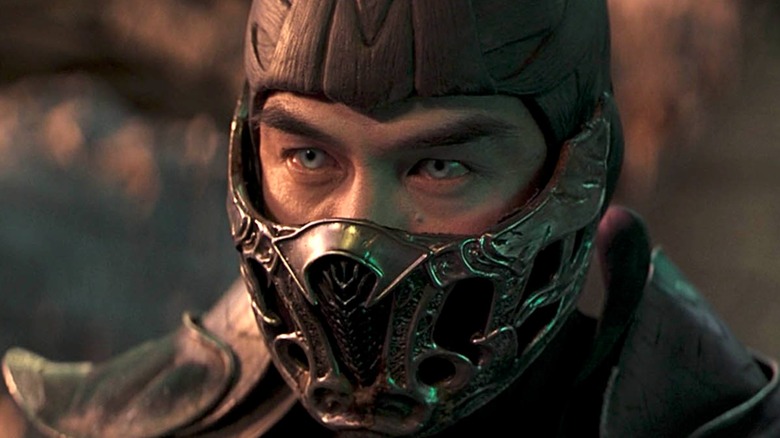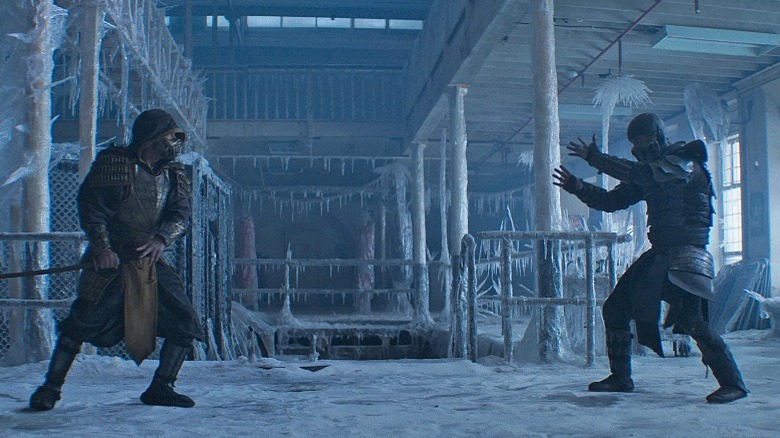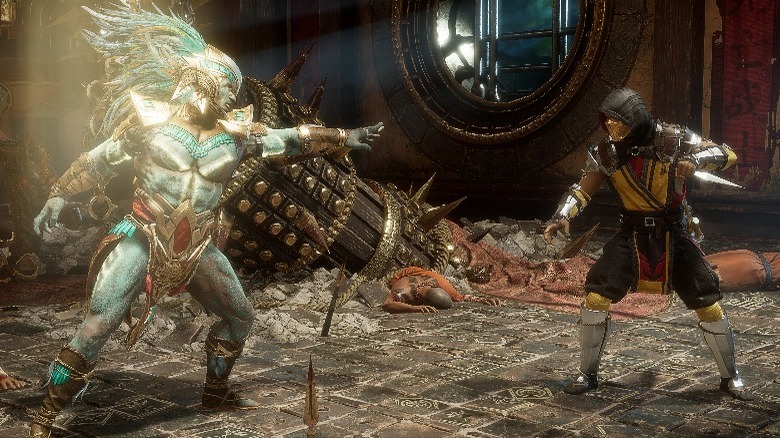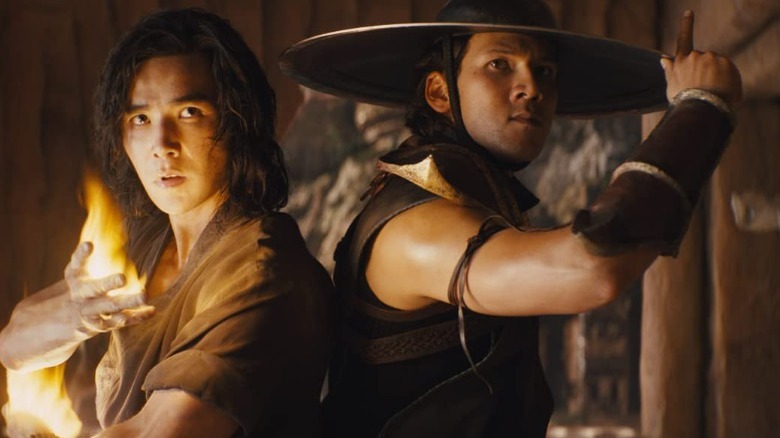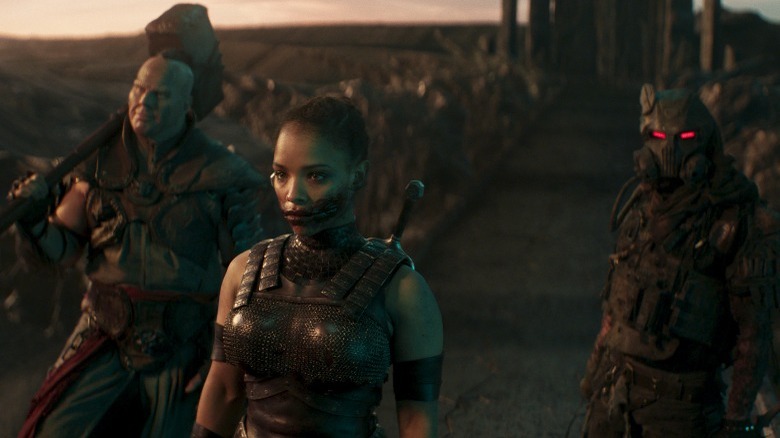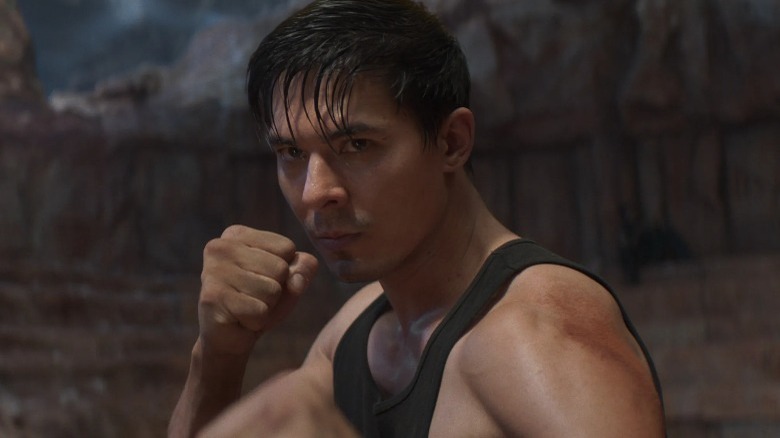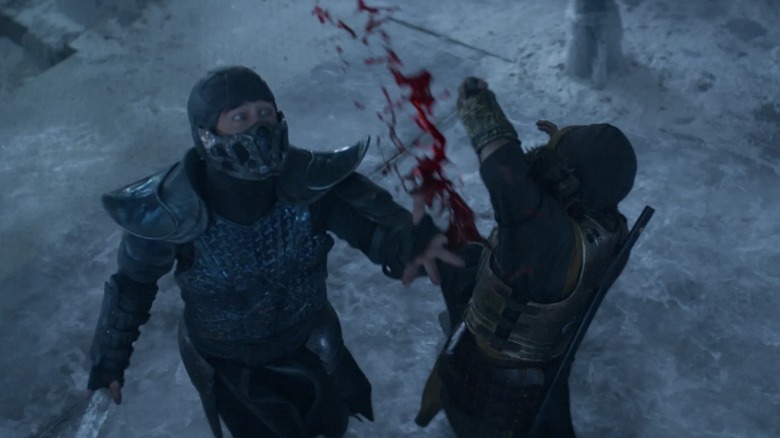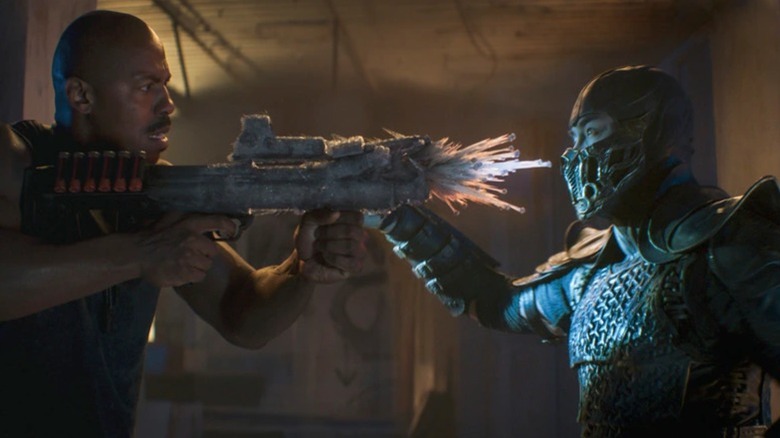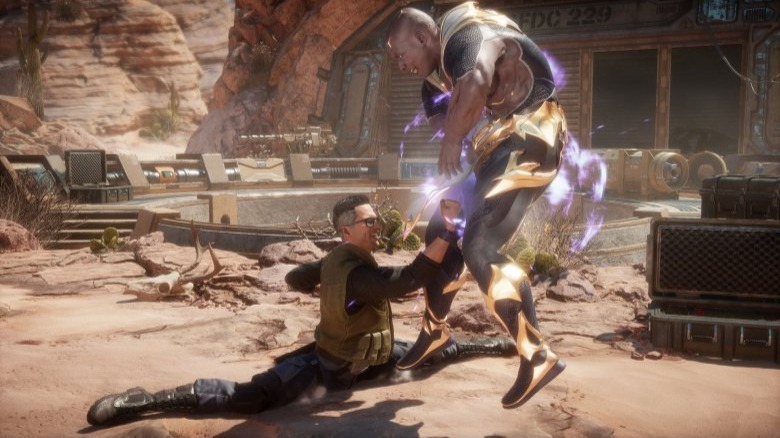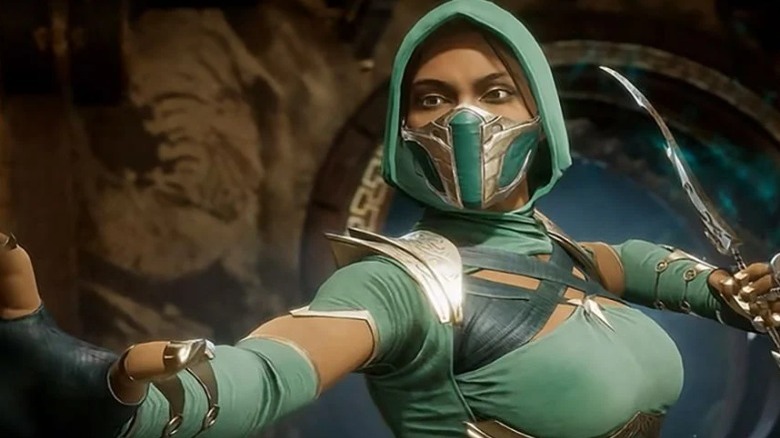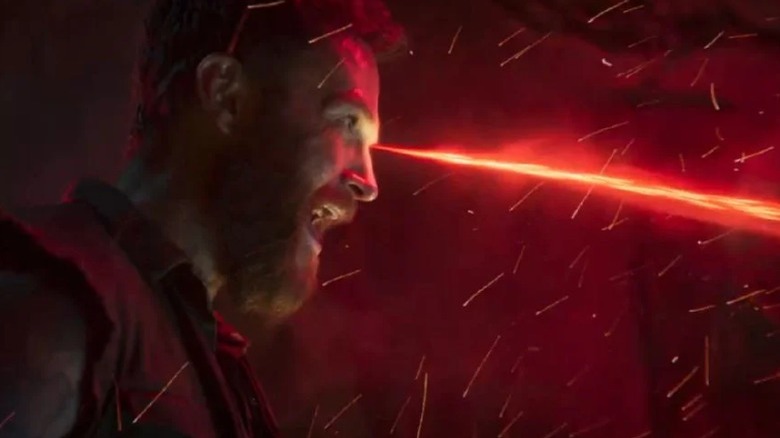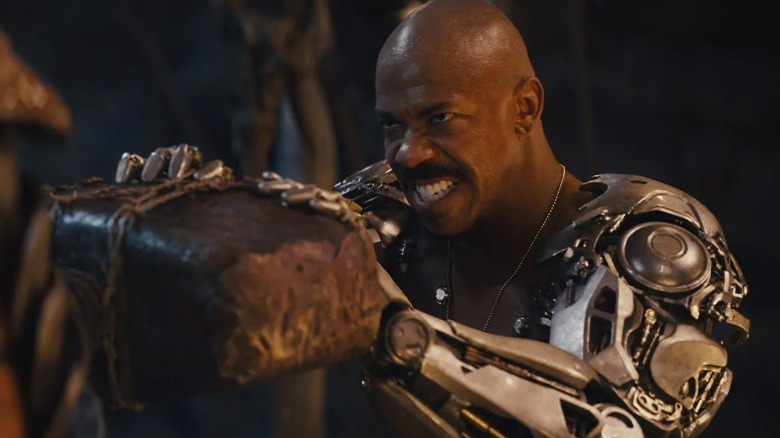Things Mortal Kombat 2 Needs To Avoid
As far as cinematic adventures based on video games go, the 1995 Paul W. S. Anderson-directed film has been revered in the gaming community since it's release. While a bit campy with terrible CGI effects at times, the film still managed to solidify itself in the halls of "Mortal Kombat" history with memorable one-liners, brilliant fight sequences, and a catchy theme song. In effect, the creative forces behind the reboot had major shoes to fill.
The question as to whether 2021's "Mortal Kombat" succeeded is still up for debate. Unlike the PG-13-rated 1995 feature film, this reboot went full-force into R territory featuring plenty of adult dialogue and viscerally brutal fatalities. Despite appeasing fans with the blood-soaked spectacle of brutal finishers, the film also took some liberties with the property that left some fans preferring to take a dip in the dead pool. However, even though the film wasn't exactly a flawless victory, it still sparked enough fan fervor to warrant a sequel. Here's what the filmmakers must avoid in the upcoming sequel in order to land that uppercut and send fans plummeting down the Pit in blissful delight.
Another tournament-less adventure
Let's be honest, it's a bit absurd to have a "Mortal Kombat" film without an actual "Mortal Kombat" tournament. Of course, the 2021 film still had plenty of brawls, blood, and guts to go around, but the legendary tournament that is the core element of the franchise was missing. In the final moments of the film, Cole suggests that Shang Tsung and his crew of devious Outerworld thugs and misfits "don't want a tournament." After all, the conniving sorcerer is attempting to cheat the system by eliminating Earthrealm's champions before the official bout rings its first bell. But Cole suggests bringing the tournament to them in their own way. But whatever way you try to spin it, the final act of the film wasn't the famed tournament we all know and love. It was simply a series of fights taking place outside of the rules and fanfare of the gladiatorial arena.
The sequel to the film would be mistaken to continue this trend. The film ends with Lord Raiden commissioning his champions to go out and find even more to join their ranks. This is where we get the big tease of Cole heading out to recruit Johnny Cage. A true tournament must be in full swing at the start of the next film. Perhaps the new recruitments occurred off-screen in between films, or these moments are relegated to a quick montage or brief sequences, but the film must contain the true-blue tournament fans are here for.
Keeping the film set in Earthrealm
"Mortal Kombat" is a diverse universe with at least seven realms mentioned in the franchise's lengthy history. Earthrealm is the pocket of the universe we're all familiar with, the very place we call home. Most of the heroic fighters to compete in the tournament hail from Earthrealm. The reason behind is this is simple: the dark forces of Outworld are consistently trying to claim dominion over Earthrealm. This can only be done through a series of victories in multiple Mortal Kombat tournaments. Since the tournament was created by the Elder gods as a means for Earthrealm to defend itself, its only fitting that many of the heroes are warriors of the planet Earth.
However, we've seen so much of Earthrealm. After all, we technically live in it. As a game series, the most memorable combat arenas were the fantasy settings of other realms. Stages like the Dead Pool, the Pit, the Soul Chamber, and even Shao Kahn's throne were all locales from the fantasy settings of other realms. The sequel needs to take us beyond Earth and fully embrace the "Mortal Kombat" universe beyond simple mentions or brief shots of these other worlds.
Creating new lore
The one thing any new "Mortal Kombat" cinematic production doesn't need is more lore. With countless games and a lasting legacy in various forms of media, there is already a deep well to draw from. The 2021 reboot started getting dicey with the addition of new lore for the series, including newcomer Cole Young and the idea that fighters' power is derived from an internal energy source known as arcana. Narratively-speaking, these two new creations were only created as tools to ground the audience in a crazy, violent, and mythical world that didn't need grounding to begin with.
Fans are looking for faithful adaptations of the storylines, struggles, and personalities that permeate the video game universe. Everyone loves watching a not-so-serious but entirely gruesome bisection with a razor-sharp hat. It's crowd pleasers like these that the sequel must expand on. Look, "Mortal Kombat" is never going to win any Academy Awards. It only makes sense for the film to embrace the over-the-top nature of the games in the most dazzling ways possible.
Reversing too many deaths
"Mortal Kombat" is a dance of death. The 2021 reboot was no different and nary a villain nor hero were spared from a bloody demise. Finish him (or her) indeed, and the film did so to great effect with many characters succumbing to their mortality. Shang Tsung was left standing empty handed as the Earthrealm heroes defeated and brutally killed Mileena, Reiko, Nitara, Kabal, Reptile, Goro, the turn-coat Kano, and, of course, Sub-Zero. On the flip side of the coin, the heroes lost Kung Lao to the icy soul-sucking death grip of Shang Tsung.
In a franchise that consistently sees the same characters returning, what are the odds that Shang Tsung or another dark magic user like Quan Chi raise the fallen villainous acolytes from the dead to once again compete? In fact, Shang Tsung teases the possibility stating that "death is only another portal." As he makes this ominous remark, we see the bodies of Sub-Zero and Goro engulfed in black smoke. Reversing deaths often feels like a cheap parlor trick that dilutes any high stakes the narrative once established. While Sub-Zero's return as the vengeful wraith known as Noob Saibot is totally necessary given the mythology, undoing the demise of others may be too much. Kano's sarcastic wit made him a fan-favorite, but the production should resist the temptation to resurrect him. Johnny Cage can easily carry the comedic torch in the sequel. Shao Khan can fill the void of the heavy-hitter that Goro vacated. For the most part, the filmmakers should leave the dead in the ground and explore new characters.
Maintaining Cole Young's subpar character
Cole Young is, perhaps, the least popular character in the new film reboot. That's likely a tough pill to swallow for the filmmakers, given that he is also the lead character. Emotionally, he's as empty as his failed fighting career. The filmmakers might as well have cast Meat in the role of Earthrealm's champion -– there's a deep cut reference for Kombat fans. All jokes aside, that's basically what Cole is -– meat, flesh, all filling of a human-shape of space.
As a video game reference, he'd be the equivalent of a silent create-a-character. The only difference is that video games allow the player to control the actions of their avatar making them feel the immersion of the moment. Movies are supposed to tell the story, and we don't need a watered-down character to act as an audience tour guide through the world of "Mortal Kombat."
What's done is done, and Cole is here to stay given the established narrative. However, the sequel cannot continue with Cole's uninteresting life and personality. He absolutely needs more color, and Scorpion can be the key to giving him that. Scorpion is one of the franchise's most popular characters. Since Cole is an established descendant of the ninja warrior, channeling a partnership with Scorpion or dipping Cole's toes further in Scorpion's legacy could solve the problem of the film's boring lead.
Too much CGI
As a film based on hand-to-hand combat, the action must feel raw and visceral. Often, blockbuster action films lose sight of that with the heavy-handed use of CGI to create death-defying sequences or build up the characters. "Mortal Kombat" had its share of CGI, which included the four-armed monstrosity Goro, and the film relied on CGI to visualize the powers of each fighter, god, or sorcerer.
But the most criminal use of CGI in the 2021 film, however, is animated blood and gore. In a film already littered with CGI effects, some elements must touch on true-life depictions to keep fans immersed in the moment. If anything in the MK universe is sacred, it's the blood and gore. Practical effects are often limited in modern productions, simply because its easier. The actors don't have to deal with the effects in the moment, like getting doused in fake blood. Additionally, the cost of the materials and the temperament it takes in nailing the shots using practical effects can be cumbersome –- especially when we live in an age where anything can easily be touched up with computer animation. But all that said, a film like "Mortal Kombat" must be careful to not get too carried away with CGI. At the very least, blood and gore should be grisly and realistic to steer the film away from feeling cheap.
Over-complicating the narrative
Maintaining a simple storyline is a hard task to manage in a film with an extensive cast. However, modern-age films like "The Avengers" have executed ensemble action stories that are plenty easy to follow. The best way to keep the "Mortal Kombat" sequel from running away with too many plot threads is to solidify a singular goal for all of its characters. That should be easy enough in an MK film -– win the tournament.
With the introduction of new characters, however, the movie enters the hazardous territory of getting over-complicated with subplots designed to provide exposition for the newcomers. This all hearkens back to the first point we made here, which is to focus on an actual Mortal Kombat tournament where each character can shine yet still interact as a team. Keep it simple, and cut out any excess fat. This is about the salvation of Earthrealm.
Taking itself too seriously
Let's remember what elements worked so well for the 2021 film. Kano, for example, was an absolute breath of crude but fresh air. He always ensured that audiences didn't take any of this ridiculousness that is "Mortal Kombat" too seriously. The video games are about as over-the-top as it gets.
Even though the stakes seem high in this film, there's still a guy with robotic arms who popped another guy's head like a bloody pimple by simply clapping his hands together. At the end of the day, we're here to just see some wildly colorful characters get their otherworldly fisticuff-style freak on in the arena. While Kano might not be around any longer to make fun of the newest plot developments for our entertainment, it's highly possible that Johnny Cage will fill those shoes, given his comedic punches (literally and figuratively) in the video game series.
Continuing with a male-heavy cast
As a video game franchise, "Mortal Kombat" has a fairly diverse roster. Of course, the earliest video game entries were from different era in American society, and the franchise's oldest characters skew heavily in the male category. That's been rectified with time. However, the reboot film didn't take advantage of the extensive female roster in the series. On the hero side, Sonya is the lone female fighter. The villains recruited Nitara and Mileena, who were dispatched brutally.
In the sequel, Sonya can't be the lone female warrior. Kitana and her mother, Sindel, should be introduced. Furthermore, Jade is a deadly femme fatale — but her only live-action representation was as a backstabbing seductress for Shao Kahn, who fed her to a horrifically CGI'd dragon in the atrocious 1997 film "Mortal Kombat: Annihilation." Jade deserves better. Additionally, Tanya, Skarlet, Li Mei, D'Vorah, and Frost are among the options for additions to the cast. Sheeva could even replace Goro as the star Shokan player in this violent world. No matter how, the sequel film needs to the balance the cast out with more female fighters.
Perpetuating the concept of arcana
The 2021 reboot took a few liberties with regards to the "Mortal Kombat" mythos. One creative addition wasn't received so kindly: the introduction of the arcana. In the video games, characters have long been capable of powerful and seemingly supernatural combat maneuvers. For instance, Liu Kang could project fireballs or Sub-Zero could command ice. However, the reboot film has established that these power moves come from a fighter's arcana, a mystical energy that comes from within.
The writers likely felt that there needed to be an easy reason to explain some of the more fantastical fight moves. What that does, however, is cheapen the legacy of each fighter and their origins. Liu Kang is a Shaolin Monk. As such, he is spiritually connected which aids him in combat. Jax's arms didn't need to come from some mystical force. They're simply technological marvels that help him in his line of work. The film never mentioned whether Sub-Zero's ice abilities were a manifestation of his arcana, but game lore shows that the Lin Kuei have always been masters of the elements.
Not everything needs an explanation. Perhaps, the concept can be recontextualized or simply ignored altogether. We won't miss it.
Reminding viewers that this is a video game film
At the end of the day, these films are an adaptation of the video game franchise. Movies based on video games typically don't fare well among audiences. They either miss the fanbase's expectations entirely in an attempt to build something for casual audiences, or they lean entirely in the other direction and forget to make something fun and entertaining in the process.
Despite the video game roots of the "Mortal Kombat" franchise, however, viewers don't need to be reminded of the source material. Of course, the film will need to adapt the core elements of the franchise. But the film shouldn't waste time trying to crack jokes about players spamming the leg sweeping move from the video games. It also doesn't need to pull from constant tropes of video game adaptations that reference quotes or one-liners as cheeky tie-ins. Instead, the filmmakers should treat these cinematic adventures like martial arts films. With this in mind, the film will solidify itself as part of a specific genre.
"Mortal Kombat" did a lot of things right. Future sequels simply need to avoid the pitfalls and tropes of past failed video game adaptations in order to claim victory.
